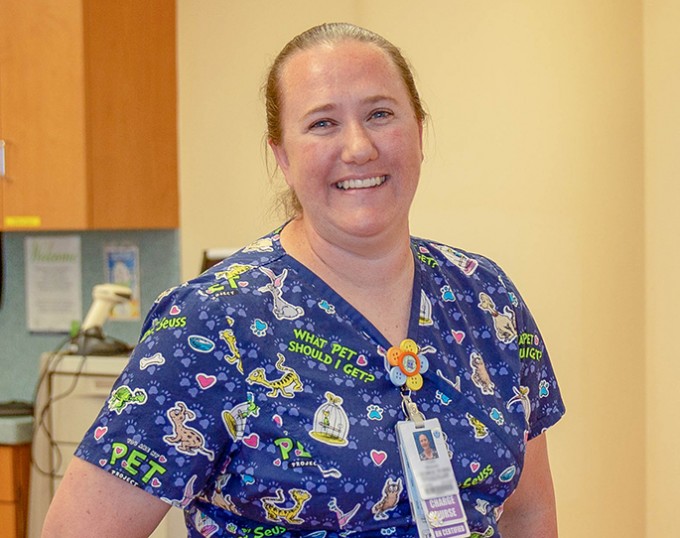My Specialty
Pediatric Acute Care, Tami Hitchcock, Loma Linda University Children’s Hospital
Treating and nurturing sick and injured children

Tami Hitchcock, RN, B.S., CPN
Pediatric Acute Care Charge Nurse
Loma Linda University Children’s Hospital
Please tell us about the trajectory of your nursing career.
I’ve always wanted to work in pediatrics. I love kids. I originally went to UC Riverside and earned a B.S. in biology in order to prepare for medical school. Towards the end of that program, I realized the differences between what doctors and nurses do. Since I wanted the more personal, hands-on approach, I changed course towards the nursing profession.
I began my nursing career at Loma Linda in 2007 as a member of the RN residency program on the acute care pediatric unit. I chose Loma Linda because I had positive memories from when my brother was a patient there. The residency really prepared me to step out as a new nurse. Through that experience, I had mentors who were available for questions and concerns, so I never felt alone. I was able to begin my career with confidence and a solid grounding of skills and knowledge.
When did you first assume charge nurse duties?
A couple of years in, I began serving as a preceptor for new grads and students. A few years after that, I became a team leader and relief charge. Then, after my youngest child was born, I began working as a charge nurse.
What are your responsibilities?
Because our unit is very large, it’s divided into three smaller units with a total of 76 beds. I’m in charge of all three units, managing anywhere between 12 and 21 nurses, plus a fair number of nursing assistants. Our managers create our schedules, but I do the patient assignments.
As charge, when families aren’t following the rules or are otherwise going against the grain, I have to go in and explain our policies. People generally aren’t too happy with me in those moments. Our nurses make it a priority to be compassionate and present for families, but we don’t always have the answers they want to hear.
What common diagnoses and conditions do you frequently see?
It’s a very diverse unit without any specific specialty. We see a great deal of trauma; pre- and post-surgical patients; and infectious diseases like meningitis, Kawasaki disease, influenza, rhinoviruses and enteroviruses. We also deal with cystic fibrosis, short bowel conditions, complications from birth anomalies, new-onset diabetes and seizure disorders. Kids on ventilators are in stepdown, but we do care for patients with trachs. We have a video monitoring room for patients with seizures; they’re on leads and we can monitor them through our video interface. However, our facility has separate units for oncology and pediatric ICU. I prefer working with the kids who are able to be up and running around. Sadly, we also frequently see kids who are victims of physical and sexual abuse.













